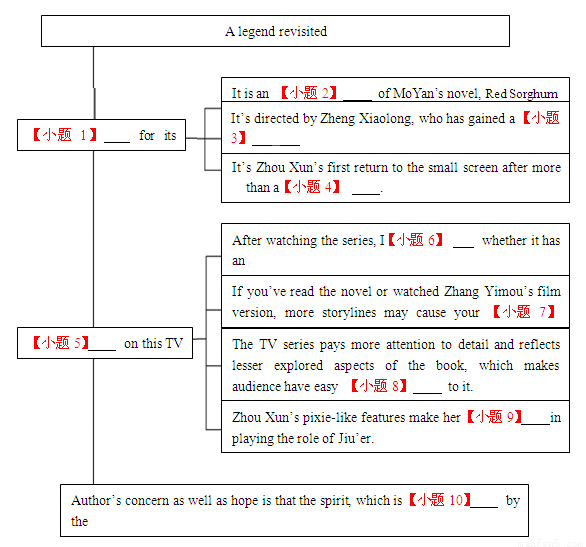题目内容
A young man went to a town and worked there. He did not have a wife and a servant did the work in his house.
The young man liked laughing a lot. He nailed the servant’s shoes to the floor on Monday, and then laughed, because he put his feet in them and fell down.
The servant was not angry, but smiled. Then the young man put brushes in his bed on Tuesday. The servant got into bed and hit the brushes with his feet. He was afraid. The young man laughed loudly again. Again the servant was not angry, but smiled.
Then on Wednesday the young man said to his servant, “You’re a nice, kind man. I am not going to be unkind to you again.”
The servant smiled and said, “And I’m not going to put any more mud from the street in your coffee.”
1.The young man went to a town ___.
A. to study
B. to work
C. to see his relative
D. to spend his holiday
2.He played a joke on the servant because ___.
A. he hated him
B. he was not satisfied with the food the servant prepared for him
C. he wanted to get pleasure
D. he liked to show off himself
3.When the young man played a joke on him, the servant was not angry but smiled because ___.
A. he liked the young man’ s action
B. making the young man laugh is his job
C. he was afraid to be fired
D. he thought he shouldn’t be angry with a child
4.What did the servant do in return to the young man?
A. He stole something from the house.
B. He gave a smile to the young man.
C. He had a fight with him.
D. He put mud into the young man’s coffee.
5.Why did the young man stop playing jokes on the servant?
A. Because the servant showed kind and nice behaviour to him
B. Because the servant told him the truth
C. Because he wanted to be a good man
D. Because his father told him to do so
1.B
2.C
3.C
4.D
5.A
【解析】
试题分析:本文主要讲了一个年轻人几次捉弄仆人的故事,但是因为仆人的善良,年轻人决定不再捉弄他。
1. young man went to a town and worked there.一个年轻人去那个地方说是去工作的,故选B。
2. young man liked laughing a lot.说明他喜欢笑。推测和仆人开玩笑是为了好玩。故选C。
3.
4. And I’m not going to put any more mud from the street in your coffee.可以得出答案。意为我不会再从街上弄泥巴然后放进你的咖啡里了。故选D。
5. a nice, kind man. I am not going to be unkind to you again.意为你是一个善良的好人,我不会再对你不友善了。可知是因为仆人的友好行为导致的。故选A。
考点:考查故事类短文阅读。

What is critical thinking? Critical thinking is defined as thinking logically and developing an ability to ask questions or ask for evidence for a particular subject. Developing critical thinking skills in a child through the right critical thinking exercises is very important.
Critical thinking develops the ability of subjective analysis of a particular fact. Critical thinking is to evaluate the reason behind a particular fact. All possible viewpoints must be thought about before analyzing a fact, and this develops problem-solving skills in a child.
Here are some exercises you can use to encourage your child to think critically.
Quiz your child. Ask your child about daily activities that he does in the school. Quiz him about certain things that do not have a single correct answer. This will increase his ability to think about the things he’s just learned in class. Keep on telling your child simple information about nature, like the seasons when flowers bloom. You can either ask him questions or just explain to him in a casual way.
Recognize and classify. For critical thinking, your child must learn to recognize important information that is closely connected with the subject. Classification of things on a certain firm and logical basis of information is included in the critical thinking ability. Colorful toys or images can be included in teaching critical thinking. Ask your child to identify the names of the flowers, fruits and animals from a colorful chart.
Critical thinking exercises are not intended to make your child intelligent, but it is about making him successful in his decision-making ability and helping him make a successful career. Although thinking habits are cultivated(培养) in early childhood through exercises, they are indeed helpful for a lifetime.
Title: Critical Thinking Exercises for Children
1.____of critical thinking | ●Thinking logically. ●An ability2._________ ●An ability to ask for evidence for a particular subject. | |
Benefits | ●Enable your child to 3.______particular facts widely and subjectively. ●Develop 4.______in a child. | |
Critical thinking exercises | Quiz | ●Ask the child about his daily activities in the school. ●Quiz him about certain things with more than one 5._________ Share simple information about 6.____ casually |
7.______ | ● Learn to recognize important information. ● Classify things on a certain firm and logical basis of information ● Ask your child to 8.__________of the flowers, fruits and animals from a colorful chart. | |
9.__________ | To develop the child’s ability to10._____ and help him make a successful career. | |
